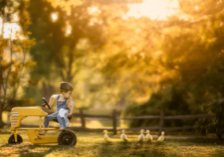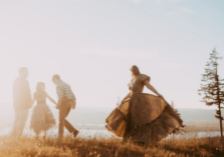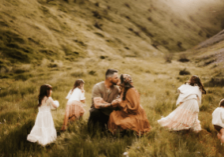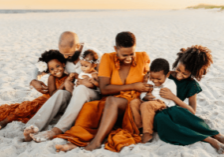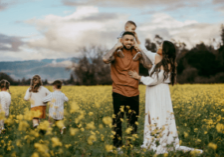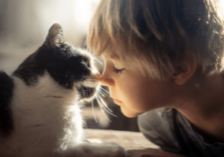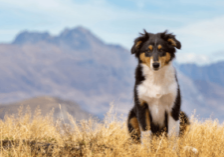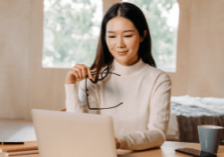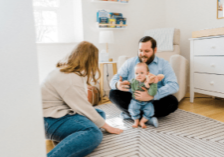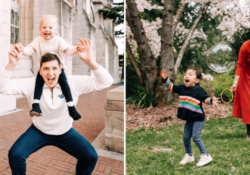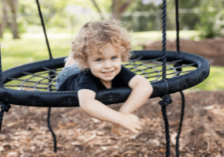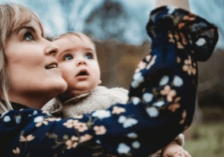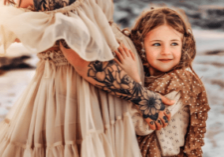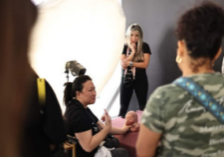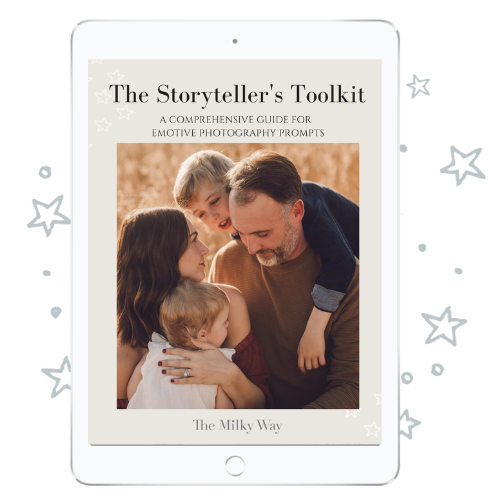Finding Meaning in Connection with Jesh de Rox
As photographers, we’re witnesses to some of the most intimate moments in a person’s life: their wedding, their journey through pregnancy, their first tender moments with a newborn. And as humans, we have the choice every day to find, facilitate, and appreciate these moments in our own lives. The only question is whether or not you’ll open yourself up to new experiences and connections.
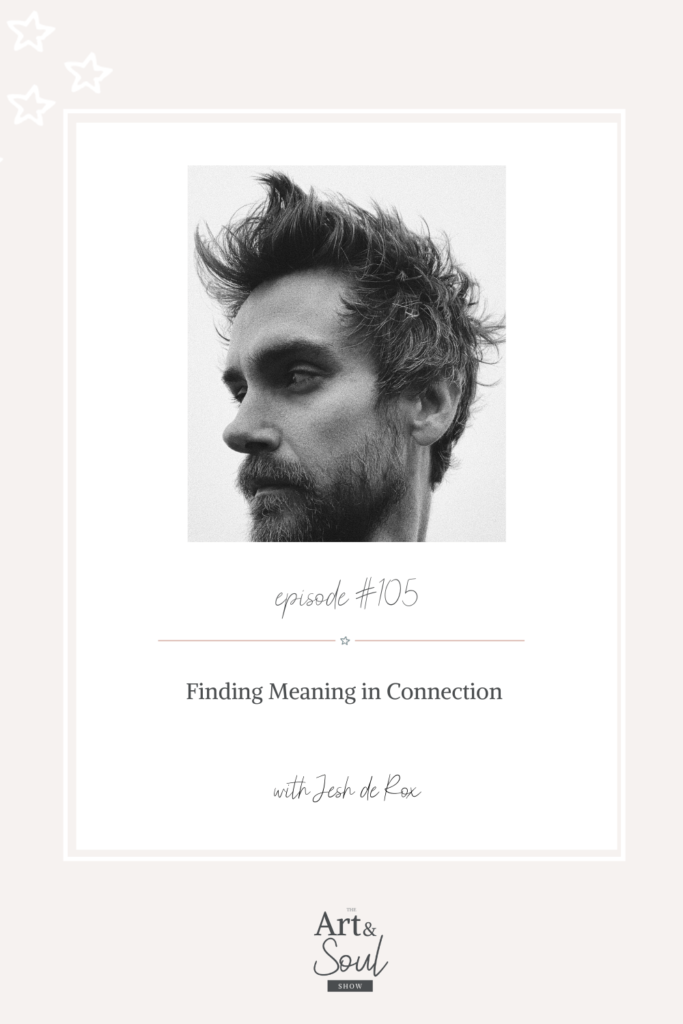
In this episode, I’m chatting with Jesh de Rox–photographer, writer, and cultural anthropologist– about how photography led him to his greater passion of understanding and facilitating human connection.
He’s explaining how social media has been designed to limit us and how to break out of our addiction to our devices. Plus, he’s sharing how the creative process has opened him up to new experiences and perspectives.
What’s in this episode:
- How we’ve become addicted to and blinded by social media [4:40]
- How you can create distance from social media and regain control of your life [14:10]
- Why we search for meaning in online communities, whether or not it’s healthy [19:29]
- How the creative process can open you up to new experiences and perspectives [22:41]
- How to break out of the cycle of addiction to social media [26:27]
- Jesh’s photography journey and how it led him to further self-exploration [32:49]
- How Jesh used human connection to change the photography industry for good [36:15]
- How to integrate the Kindrêd method of meditation into your daily life [37:44]
- Jesh’s vision for sharing Kindrêd with the world [49:35]
- How to create a business that feels authentic and aligned [52:23]
- The value of honest conversation and self-exploration as a creative [1:00:21]
If you want to break out of the daily grind and pursue deeper connections in your own life, you don’t want to miss this episode.
SUBSCRIBE: iTunes | Spotify | Stitcher
Resources Mentioned
Learn more about Superfeel, a technique for photographers to evoke real emotion in their subjects.
Meet Jesh de Rox
Jesh is a cultural anthropologist, photographer, writer, speaker & creative entrepreneur who is fascinated with how the mind & body create feelings. He is the creator of the Superfeel method, which allows photographers to capture real emotions in their subjects. He’s also the founder of Kindrêd, a modern method of meditation fit for our distraction-heavy world.
Connect with Jesh
Explore the Kindrêd method and Business as an Art Form
Transcript:
[00:00:00] Jesh: I think in the future, they will look back at this time and they will be shocked how many people were spending, how much of their time. Completely not even donating their time, investing their time and energy into someone else’s company. Instagram and all of that stuff is basically TB that we are producing for free and someone out there that is at this point, an invisible computer person algorithm. PAC is deciding which of those programs to air and which not. And it works in a very similar principle as the lottery does. It’s a completely irrational thing to buy lottery tickets. And yet millions of people do every single week and one person wins and most people lose. That’s how that whole system is set up.
[00:01:03] Lisa: Welcome to the Art and Soul show where we dove into heart opening chats on photography, business life and that messy in between. I’m your host, Lisa DiGeso, a mom, a photographer and entrepreneur, and I’ll be sharing honest conversations and advice for photographers with insight on mindset, entrepreneurship and creativity. The goal of this podcast is for you to be able to gain insights and strategies that will get you real results. Because let’s face it, having a photography business can be lonely, but it doesn’t have to be. This is the place you can go when you need a boost of encouragement, a kick in the pants and inspiration to pick up a camera. This is the Art and Soul show. Hello, my friends. Welcome back to the show. Today I have just Iraq sign as my guest. Now I’m really excited to dove into this conversation with Josh because he lives a life of such curiosity and intention, and I’m always so curious to hear his takes on things. Now he is the owner of Feel Kindred. He is the owner of business as an art form, and he’s just an all around cool human being. So without further ado, here is just Iraq’s. So tell us who you are and what you’re passionate about.
[00:02:22] Jesh: I mean, who you are is a pretty big question. But the main thing I would say is just really, really interested in human bodies, human connection, human minds, how we. Decide what to do each day. I mean, it’s pretty crazy to think that there’s. Seven and a half billion people every single day have to decide what to do, I’m really interested in why they pick what they pick. And I’m especially interested in the people who create the choices from which most other people are choosing, because it’s kind of these two things we do, we create and we consume. And much more of us consume much more of the time than we create, even though all humans are inherently capable of both. A lot of our time is spent in that consumption and I spend a lot of my life really interested in how that ends up affecting our quality of life and. Why creation is so much more rare and consumption and who the people are that are doing, the ones who are doing the majority of creation and how they got that way and the costs involved in that because there’s costs to everything. So whenever you have that many people on the planet. Swayed in such a heavy way, there’s biological reasons behind it, and I’ve really spent my entire life studying those things, being fascinated with them. Obsessed with them. And from all of that research has come to some pretty interesting insights into why humans are the way that they are and have been able to translate those in a few different ways into products and services that are dedicated to raising quality of life for as many people as possible. So that’s me.
[00:04:36] Lisa: I love that. It’s a beautiful answer.
[00:04:38] Jesh: Wow, thank you.
[00:04:40] Lisa: So my question actually is not even on the questions I prepared because I’m always curious by nature, and I just love to dove into a conversation. So I loved when you talked about consumption. And I think my question really is about social media and how has that changed our brains and how we view the world, how we change our decision making based on what we’re consuming and what we’re seeing? And how can we regain control or mindfulness around how and what we’re consuming and taking, you know, I guess the power back?
[00:05:17] Jesh: I think in the future, they will look back at this time and they will be shocked. How many people were spending, how much of their time? Completely not even donating their time, investing their time and energy into someone else’s company? Instagram and all of that stuff is basically TV that we are producing for free and someone out there that is at this point, an invisible computer person algorithm, PAC is deciding which of those programs to air and which not. And it works in a very similar principle as the lottery does. It’s a completely irrational thing to buy lottery tickets. And yet millions of people do every single week and one person wins. Most people lose. That’s how that whole system is set up. Social media is the same. It’s much more insidious than people are aware of. And even though everybody is a little bit more now talking about the dangers of it, it’s kind of laughed off. It’s shrugged off. We’re talking about the dangers of it on social media, which is so ironic. I study free will. Well, that’s another way to say what I study, because the difference between the consumption and the creation has a lot to do with the difference between whether somebody is accessing their free will or not. And if you have a defined set of choices that you’re facing and you choose from one of the predefined set of choices, it’s very arguable that you are not in fact, using your free will. And these systems that have been created for us are, to be very honest with you. Advanced versions of those hog and cow lines where they line them all up and they’re taking them in to be killed, basically. And that might sound a little bit extreme, but. The thing that separates us, in my opinion, from most, all other forms of life is our stunning. Potential amount of choices that we have each day, a bird really only has so many choices. Walsh has so many choices and has so many choices. The amount of choices that a human has on how to spend their time and how to interact with all three of those things and those three things would never normally interact with each other at all. Not only can we interact with those three things, we can start making a list of all the things on Earth. We can interact with every single one of them that we’ve found, let alone the billions that we haven’t found yet. The complexity of those interactions are mind boggling. To even start to consider all of that to me, is related to this really deep subject of free will. And even though we have the capability of doing that a lot of the time, we are not at all drawing upon that. We evolved from creatures who were much simpler than we are, and those simple pieces of it still exist almost entirely intact the way they were originally formed inside the brain. And so this whole idea of us and like who I am, we speak of it in the language as if it were a singular thing when in fact, every single person is a multi being. Not in some kind of esoteric philosophical way. Chemically, we are a collection of different kinds of animals. You could even say all amalgamated into something that has one voice that is very deceptive: one face, one voice. It hides how many different versions of us really are existing just in our own minds, let alone the effect that our family and friends have on us and our ancestors. And I mean, the permutations of that really start to get infinitely ridiculous as soon as you start adding them all up, bringing that back to something like social media. One of the reasons why it’s it’s so powerful is because a part of what people crave is simplicity, and there’s a great limiting of choices inside of a computer program or an app where you only have to choose whether to scroll up or to scroll down to to press a heart or to present to not press a heart. That reduces the profound complexity of life into a very simple set of choices, and it hits upon the brain’s reward system, where if you click a heart on something that you liked and dopamine releases and says you just did something like, good job, you accomplished it. And the problem, of course, is that you did almost absolutely nothing. And that addiction to that dopamine drip that’s happening is by far the most dangerous form of addiction that has so far existed on Earth by far the most popular. And what really breaks my heart the most is that people don’t know what they’re missing. They don’t understand who they could become separate from those systems. And I’m not just putting down social media. I mean, this social media is really just the tip of a spear that’s been, you know, sharpening for many hundreds of years around commerce and before commerce. It was a religious organization and, you know, it was also a governmental organization. So it’s just these large organizations in general that invariably have a very few people at the top. And to many, many people in the bottom, they’re all pyramidal in shape and they do not respect as a whole. They do not respect the profound worth and importance of the individual voice. And my life is completely dedicated to understanding the role of the individual voice, to understanding what nurtures it, what helps it to develop and grow and what stifles it and what prevents it from happening. And that being the focus of my work, I am so I don’t even know what the right word is. Have a profound respect for it in the way that you would respect, like a hunting lion, you know, for these kinds of systems because they are powerful and they certainly do have some benefits. But the cost people are paying for them are literally the hours of their life, the days of their life in these small little moments and our lives are being stolen from us and we’re signing up to do it.
[00:12:21] Lisa: Voluntarily.
[00:12:23] Jesh: Voluntarily. I wrote one time about when I was a kid. I was on this farm for a while. We traveled a lot and we lived on this farm far up north in Canada, and I would see these. Is the sheep like on the way to get killed in this, you know, hen kind of situation and they were just chewing their grass? They didn’t know and that’s why they weren’t upset because they had grass in their mouths, you know, but there was a sheep behind them. There’s a sheep in front of them and they were chewing grass. That’s all they knew about the world and grass is important. They need to eat. And it’s a similar kind of thing. People are not aware of the larger picture that’s happening, in which they are slowly and surely being led towards something that does not care about them, does not have their best interests in mind, does not value them. And all of that is being overlooked because there’s grass in their mouths.
[00:13:24] Lisa: But our minds you have. Have you ever seen that movie WALL-E? Yes, it did. And there is like a scene in there where they’re just being fed milkshakes in front of screens. And it’s horrifying. And this was, I think this was put out like I think it was even put out even before the iPhone came out. Wow. And I think even before iPads and how like this is a reality that we are creating and living and not questioning.
[00:13:55] Jesh: And The Matrix two, I mean, The Matrix was a hugely popular movie. Oh yeah. It rang a chord in people because there is a subconscious awareness of these things that I’m saying, even though they’re not super popular things to think about or talk about, and they’re very real.
[00:14:10] Lisa: So what can a person do?
[00:14:13] Jesh: Well, I am a person who is not really against things. I think as soon as a person becomes someone who is against something you actually engage with and you become a part of the energy cycle of it. There is this thing where you can’t have an argument if there’s not two people and there are certain kinds of people who I like myself when I was younger, I wouldn’t get drawn into the argument in a flashy, emotional way, but I would be very silent and reserved, thinking maybe that I was, you know, above what was happening right now. That was deceiving myself, because the truth is that it does require two people to have an argument and in a similar kind of a way, I know, you know, protesting has become very, very popular recently. I personally think that a lot of what is called activism, and again, this is not necessarily a popular point of view, but this has just been my experience. A lot of what is considered activism is actually a strong emotional response that we feel by considering ourselves to be a part of a large group of energy. And I think it’s a biological thing. It’s part of the herd instinct, and I’m not putting those people down. I just think that it’s very important to be aware of why we’re really doing the things that we’re doing. And part of why I think this is an important thing to look at is it’s not that all the activists agree on what to be actively about. You’ve got basically people split into two sides. One is very passionate that the other is wrong. They are. They’re very passionate, but the other person is wrong. And meanwhile, life, meanwhile, joy, meanwhile, beauty, meanwhile, kindness. Meanwhile, creativity, you are never going to solve any problem that is persistent and widespread without the use of creativity. It’s not even possible to do that. And yet most activism in that kind of a way of being is a repeat of slogans. And it’s a sharing of ideas that somebody else had that you didn’t have. And I’m not saying there’s no value in other people’s ideas. Of course there is. But the ability that we have to create is so important and profound in making any of these decisions different than they are. And I’m concerned in many ways about those group identities that people place themselves inside of because group identities like these political and religious organizations, even when they have good intentions behind them, are like template personalities. They tell you what you need to think, what you need to feel and what you need to say and what you need to wear sometimes and what you need to be posting about on social media, what you don’t need to be posting about. If we just take a step back from that for a second and look at that, there’s some external force dictating to us what’s right and what’s wrong about these things. And for all that religion has got a really bad rap over the last few decades. But what I was just describing is very much a religion of a different kind and maybe the word God has been switched out for justice or patriotism or whatever it is, you want to switch it out. I’m a person who really likes to look beyond the words deeper than the words to really get the truth of it. And that comes from the human body. Your body. It will be a more honest source of understanding where you’re really at in something way more than words. Somebody can say the word I love you to you, and that can mean a whole range of 500000 different things completely dependent not on the word or the phrase that’s used, but the state of the body while those words are being said. And what I see a lot of in that back and forth fighting is just that it’s warfare, it’s warfare. So fighting for peace. Is in itself a kind of a conundrum, and again, in no way disrespecting any of those people or the way that they’re spending their time, I just am really interested in how things actually change and how things actually move forward. And you know, for instance, there was a really big push during the pandemic of certain kinds of causes. And for all of that, that happened, what really is different, you know, not that much later. And it’s I’m saying all that point just to say that even these things I’m talking obviously passionately about, I am not against any of them. I’m not against those things, but I am for the human spirit. I am for the personal expression of the voice. I am for self-respect and self-responsibility and for kindness and empathy. Those are the things that I am for. And so in looking really deeply at that, what you see is that there’s a lot of people on the planet who want to be a part of making it better. There’s a lot of people really looking for meaning, I think more now than ever in a big way because religion used to supply meaning. For us, that was one of its major benefits and it did it very, very well, you know, in a lot of measurements. But as that got kicked out, there is now this dearth, just like this missing piece that humans require to function peaceably and healthily. Is that the meaning? And so there’s kind of this a menu of, you know, a smorgasbord of offerings available to us right now. You can be left, you can be right, you know, you can be pro this, you can be entered this. There’s just a few popular ones, and I want something better than those choices.
[00:20:28] Lisa: I agree. I agree. And I think at the heart of it too, it’s lonely people looking for connection and trying and looking for a sense of belonging and fitting into something, whether or not they actually align with all the values or what this certain group believes in. You hear all these stories about people that, you know, it’s a horrible example, but it was like someone got into some, oh gosh, white supremacy group or something. And she’s like, How did I get here? She’s like, I. She’s like, I just was so lonely that I, I don’t even know how I got here and I. And it’s just it’s just it blows your mind. Honestly, it really blows my mind that we that your discernment and your sense of belonging can just get so muddled.
[00:21:23] Jesh: Well, it comes back to what we were talking about before, which is that we are these complex creatures made of many different parts, and it’s such sadness that we are not taught more about how we are formed and the shape of the brain and what we know about the mind, because how we think and the way we feel, what we feel. These become the most defining factors of any piece of how we form. And that’s another big piece that I’m so fascinated with is the development of personality. And we’re taught so much about the external factors around us that will influence us. And we’re taught almost nothing. I mean, the inside of us, even just to say, I want to talk about what’s happening inside me, even just a few years ago, you know you would have been laughed at. It’s a little bit more. Now we’re starting to be a little bit more OK with that conversation, but again, in the future, never look back and they’ll be like, you know, a five year old will be saying,
[00:22:21] Jesh: Mommy, I didn’t teach you about what you were made of or what was inside.
[00:22:27] Jesh: You know how they did and how they live? They were hardly living. It was an entirely different span of history. So circling back to what can we do about this?
[00:22:40] Lisa: Mm-Hmm.
[00:22:41] Jesh: Again, I think it’s really important to look at if a person is wanting to experience something that they are not already experiencing. The only way to make that happen is to introduce change, introduce a break in pattern into the scenario. And as obvious as that is to say that it is something that very few people on a regular basis are actually taking part in and constant commitment to exploration even in just small ways, which really is the journey of what it means to be an artist. What it means to be a creative constant exploration, even in tiny bite sized steps, will invariably lead you to a widened band of potential experiences from which you can. Increase the amount of choices that you have, because even when we say something like I’ve grown so much over the last three years, we’re not talking about hate. We’re not talking about, you know, muscle mass. What we mean is that three years ago, I would have been in a certain situation and I would have only seen this choice or that choice. Now, three years later, I see those choices, but I also see this one and I also see this one. And this one is really the one that’s going to enable me to get through this in the healthiest, most beneficial way, most respectful way to the people around me. That’s all growth is. Growth is an increase in the number of possible choices that we see as a response. And so when you look at it that way, it’s deeply related to what free will is. And it again puts the responsibility back on us to say there is nothing you could possibly be doing. That is more important than that daily work of slowly expanding your own awareness of how the world works. And the most important piece of that is how your brain works, how your body works, how the two connect, the reasons that they don’t. That work is just, it’s sacred. It’s irreplaceable. It’s profound. It is the most important work of anybody’s life. And it’s why I have such a challenge with these addictive forces outside of us. And the people know that they’re addictive. They’re very well designed to be addictive, that draws people away from their vital, vital work. And to me, it’s not that dissimilar to a mother who’s feeding a baby. There is no more important work in the world that that person could possibly do at that moment than feed that baby. And meanwhile, you have someone else outside saying, Look at this, look at this. What about this thing over here? And the mother detaches from that baby. We all have this baby inside of us, this potential of who we could become. And it does not grow from outside forces. It grows only from personal conscious awareness and attention, building friendship with it between yourself and that little baby over long stretches of time. And most people are not doing that work, and the society does not suggest that it does not encourage it. It is few and far between at this stage in history, and I am so heartened by how easy it actually is to. Start doing the things that we need to be doing because it’s not as a road map, someone else’s last, it’s paying attention to our own sense of wonder and curiosity. And as we continue to honor those two very important pieces that are inherent in the body, you don’t have to teach wonder or curiosity. They’re already there. You just have to honor them and pay attention to them and choose them on a more regular basis. That alone will take you places that no one has ever been before, so some meeting all of that in one simple sentence. I think one of the most helpful things somebody could do to get out of that trap of having their life sucked away by all of these things, not just social media but addictive things of all kinds, is just to ask yourself, Have I done this before? That one question that this thing I’m doing right now, have I done it before and if I have the answers yes to that, then the next follow up question is would I be OK doing this thing for the rest of my life? And that’s exactly what I’d be happy with. I’d be proud of that life today. And if the answer to that is no by God, you need to stop.
[00:27:46] Lisa: Don’t stop doing it. Oh my gosh, that’s great advice. It’s so true. It’s so true. You know, and I think, you know, like there’s been times I’ve had digital media breaks where I’ve just deleted apps and just kind of prohibited myself from even going on. And the fascinating part to me, I didn’t know what to do with myself and that the uncomfortableness of I’ve been numbing. And now what? You know, and just that awareness around it, it’s because you don’t realize, you know, and you don’t realize that you’ve been on top for four hours looking at cat videos and you’re going to look like I should have been hanging out with my son. We played Scrabble or, you know, like we could have taken a walk and, you know, having to have some meaningful conversation. Yet I have no doubt with cat videos. And I am happy with that. And I’m going to be happy with that, right?
[00:28:46] Jesh: And again, I and to anyone listening, like zero percent of me has judgment for any part of that. These things are designed to trick you. They’re designed to steal you like the judgment, I think is just as dangerous as any other part of it. It’s not about that of ourselves or of anybody else. And yet that responsibility does ultimately fall on us to do something about it. And I think one of the reasons why this is clear to me and perhaps someone else will be that I have been very lucky to see in my life a lot of very extraordinary things that human bodies are capable of doing. And having seen that on such a regular basis, it’s such a strong contrast for me between what someone is capable of, what they feel like, when they’re at their best compared to where they might be while they’re scrolling. And again, the loss is more apparent to me, and that is almost always what spurs change in people is when they become aware of what they’re losing. You see profound change in behavior between loved ones when somebody nearly dies or does die. I know people who couldn’t stand their partner and once their partner changes or shifts into the next, you know, expression, they’re just like, they were the best.
[00:30:22] Jesh: No one was ever as good as them, and I was like, Shit, is this the same person that we were just talking about, you know, last week and they were everything to me. And yeah, you love it. So true. It’s so true.
[00:30:38] Jesh: It’s human. It’s very, very human to do that. And again, committing yourself to a life of exploration allows you to just have more points of contrast to potentially be able to compare these choices that you’re making. And having seen and felt some of the things that my body is capable of, I would just never be satisfied with anything less than that. And it doesn’t mean I’m not susceptible to my own addictions. We all are. That’s a big part of what it is to be human is to face those things. I actually think addiction is best described as the opposite of exploration. And one of the reasons I think that’s so important is because it simplifies what we need to do about addiction. It’s not something to fight against. That’s a losing game. Instead, just open yourself up to new things if you haven’t done it before. Try it even as simple as the way you say, I love you to your kids at night or you say, I love you to your partner. You can be explored in that most people are very patterned, based in all parts of their life. Instead of taking your kids into night and a normal way. Crawl in like a like a dog or like a
[00:32:02] Jesh: mouse or something and be like, I’m the moves of good night and they’ll be like, What are you doing, man? And it will be weird and it will be fun. Think it will be? And they’ll love it.
[00:32:14] Jesh: And that’s like my hope for the world is that it’s just so simple, actually to break a pattern. It’s just really rare. But it’s not rare because it’s impossible. It’s just not done very often. But I love the pattern that’s been standing for 40 years can just break in a second just by one choice. There’s a lot of hope in that.
[00:32:40] Lisa: There truly is. Now you started as a photographer, I first was introduced to you as a photographer. Are you still shooting?
[00:32:49] Jesh: I don’t shoot very often anymore. It’s something I do sometimes. But my primary interest in photography was always the incredible invitation that it was for two or more people to get to. Communicate in kind of an intimate setting. Your job is basically to ask someone who they are and for them to show you that. And that can be treated at a very surface level, which most people do, or it can be an invitation to really go in. And it’s similar to how someone says, How are you doing? And then you respond back, Oh, I’m great. How are you doing?
[00:33:31] Jesh: That’s one way. Yeah, and it’s fine now, but no one’s going to walk away from a conversation like that, you know, mind blown. I asked her how she was doing and she said, fine. It was amazing. Next thing next–
[00:33:46] Lisa: Best conversation I’ve ever had in my life.
[00:33:47] Jesh: Yes. You think so when someone says, How are you? You can also just answer honestly. And you can check in. And I made that a personal practice. Even when I’m at the grocery store getting stuff and someone says, How are you doing today? I always stop and I check in and I’m like, How am I doing? And then I tell the truth, whatever it is, that’s happening and it leads to weird looks and lots of laughter and a bright small moment of joy in a day that is otherwise probably filled with a lot of monotony. And so that invitation that you get there as a photographer not only provides that potential. It also really puts the captain’s wheel in your hand because they’re coming to you to help them tell you who they are. That’s a big, scary responsibility. And if you really honor that, there’s a really beautiful thing that can happen where you can show them that you are actually interested in knowing. And that true pure interest is honestly so rare even inside of friendships, even inside of familial connections that when somebody really feels that and they feel that’s a safe place to share, they will because it’s at our core to be able to share who we are. It’s just that there’s not often space for it. And so I loved that about photography. I fell in love with that space, and at that time in my life, I was in my early 20s and I was very socialized at that point because of my weird childhood and I didn’t know how to create situations in which I could get to that level with people at that time. And so photography kind of handed me that, and I’m so grateful for that experience because I basically got to stare at other strangers and ask them very unusual personal things and get to hear their wildly beautiful and profound responses. And I was changed by that. So I don’t really do that anymore, because I have found more efficient ways of getting to the place that I want to get to with people. But it served as a priceless step on that path.
[00:36:15] Lisa: Yeah, I love that now. Like, I was first introduced to you in 2011 with the beloved cards, and I know you had a course on that that I own as well. Are you still doing guys? I know it kind of morphed into Superfeel. Is that correct? And are you still doing now still offering that?
[00:36:33] Jesh: Yeah, I am not running that company, but I am. I’m still a part owner of it. Yeah, yeah. And it’s kind of taken what I did and has offered it in a different form. So that’s continuing because it honestly ended up changing the entire industry standard at this point in your.
[00:36:54] Lisa: You were the OG of the storytelling feeling session and full credit to you.
[00:37:01] Jesh: Well, I mean, thank you. And it is fascinating to watch that happen because I was actually quite controversial in my time.
[00:37:09] Jesh: I know. I remember. I mean, people were very upset. I know you also were very upset that I was suggesting that we should give more what somebody’s spatial structure was. I know and I like it.
[00:37:23] Jesh: You know, ten years later, it’s become an industry standard. And yet I the last kind of look that we did there was something like four hundred thousand people, you know, that had done some form of that easily.
[00:37:38] Jesh: Usually it’s more wild. It was a wild thing to see and be a totally wild.
[00:37:44] Lisa: I love that. So tell me a little bit about Kindred because I’ve been diving a little bit more into meditation myself over the past few years. And so should the kindred method be used as a daily practice? And what advice do you have for adding it and when everything feels so busy and you’re like doing one more thing to do?
[00:38:04] Jesh: I think one of people’s biggest problems on the planet right now, as I kind of mentioned earlier, is that they’re overwhelmed. Like, if I had to use one word to describe most humans, it would be overwhelming. And when you look at the amount of ad impressions alone that someone in America is going to have, it’s somewhere around 10000 just on ad impressions. And then when you look at communications back and forth between attacking people and social media, you’re looking at 20 30 thousand thirty thousand ideas flying at somebody. And it’s like in those movies where there’s somebody running, you know, in a war like in the medieval times and there’s all these arrows that go up in the air and then come down this huge.
[00:38:54] Jesh: arc and there’s one person running. It’s honestly like that. We’re in a war of.
[00:38:59] Jesh: ideas right now. And even though we’re being told we’re in peacetime, we’re not. We’re at war and the war is for our attention. That’s the thing at stake. And there’s just arrows from every direction piercing us. And I have to just briefly say that the bodies were not designed for that surprise surprise. You know, our ancestors on the savanna in the jungles were not intimidated by ideas. Nobody had ideas. Ideas were like really rare things.
[00:39:31] Jesh: You just don’t have ideas. Trees don’t have any built. Monkeys don’t have a lot of ideas. They get a few ideas. You know, there’s 30000 a day. It’s just stupid. It’s like, yeah, way beyond.
[00:39:42] Jesh: So part of the challenge, I think of something like meditation, the purpose of which ultimately is to be able to give yourself the space to build that friendship. I was talking about before someone asked me how to describe meditation, and I responded. For me, the easiest way I know to describe what meditation really is is if the universe was a mother, then meditation would be breastfeeding. So it’s kind of like that. You give yourself that moment to connect to this stunning, priceless precious material from which you will build yourself and the meditative space is not about cleaning your mind and thinking of nothing that would be like saying, you know, put a baby in front of a boob or something. That’s not the whole thing.
[00:40:45] Jesh: That’s the start. And there’s a whole nother super important thing, which is that you need to be able to connect. You know, I honestly think a lot of things would be.
[00:40:56] Jesh: Meditators are having problems latching, so to speak, only.
[00:41:00] Lisa: Oh my gosh, it’s so true.
[00:41:03] Jesh: They’re not getting to the part where your body starts filling like the beautiful thing. And meditation was probably always hard for people, but it was definitely created originally in what we could call the pre-Netflix age and the pre-TikTok age. And our attention spans have gone from not great to nearly invisible. And that classic version of meditation, where you’re supposed to sit still and do nothing for hours at a time is nearly impossible for ninety nine percent of the population. And for those people that I’m working for, deep respect, super thankful and grateful to them, it does not work for most people. And so what I have been developing for the last 15 years, everything that I learned doing beloved and superficial that I learned in those spaces basically got put into this other project. And what kind of like started that journey for me is at the end of these two hour sessions I would have with people shooting them. And initially as a photographer, they would say things like we fell in love again last night, and this was the most special time we’ve had in our whole marriage. They would say this reminds me of when we first fell in love with each other. I literally had people say this was one of the best moments of my life. And I would walk away from those things being like, How is it possible that an interaction with somebody that you don’t know gives you access to these feelings that your own body is creating telling you? This was one of the best moments of my life. I got so fascinated with that that it very quickly eclipsed the excitement of making a beautiful image of somebody. Because as fun as that was, I was way more interested in this response that they were having. And so Kindred is basically an evolution of the way that I was interacting with people back at that time to allow them to have easier access to their own bodies’ capabilities of creating feelings. All feelings are actually created by our own bodies, and we don’t really know or think of that because we constantly have this association with feelings of being triggered by external sources for good or for difficulty. And the fact is, it’s not anything outside of you that ever makes you feel anything. There’s always a decision, whether conscious, usually subconscious, that says, OK, release this particular feeling. So what really makes it different from a lot of other practices is that instead of trying everything out and being quiet, which, let’s face it, is a really tough task. These days you’re asked instead not to focus on the breath or on a clear mind, which are, in my opinion, fairly difficult things for most human animals. Instead, you’re asked to focus on generating specific feelings, and the body not only is capable of doing that. That’s basically what TV is. You’re watching other people feel things. And we have a system in us that’s called the Mirror Neuron Network that helps us to feel pieces of what other people are feeling. And that’s why a great photography image will make you laugh or cry or smile. That’s why a great film or a great song wins because the The Mirror Neuron Network and Kindred actually uses that system in a very, very simple way that helps people with in meditations as small as four minutes to be able to reach state of euphoria where they’re able to honestly access feelings that are similar to what people describe they feel when they’re doing drugs or during the quote unquote best moments of their life. I got really interested in what were the best moments of people’s lives, like, what does that even mean and what it really means on a chemical level is a certain release of certain hormones.
[00:45:32] Lisa: That’s like intense dopamine or like serotonin. Like what? Like what’s happening in your eyes?
[00:45:39] Jesh: A lot is happening there, and we’re actually working with neuroscientists in several different countries who are fascinated with this process. I came about it. That’s very strange and you sure do. And they’ve been studying strange, unusual things in their own way, and we really kind of mixed and matched, and we’re really fascinated by what each other had been finding. And so there’s all kinds of things like serotonin, there’s dopamine, there’s GABA, there’s oxytocin. A lot of this stuff is coming into play when we’re doing this practice. And the practice has been, as I said, experimented with and designed and refined over all these years. To now, it is literally at a point where someone can do a four minute meditation that involves simple, rhythmic movements of the body, which is a big missing piece, in my opinion, from a lot of classical forms of meditation. The body needs to be involved. This is not just a thing of the mind because emotions are a full body response. They are not mental. There’s a piece of them that is mental. But to think of emotions as something that is just of your brain is to entirely miss out on the most activating part of it, which is facial expression and body expression through the hands and to the movement. So movement is a really important piece, but it’s very simple, non-threatening movements that are actually quite intuitive and natural. And then there’s also simple, guided imagination, sparking focal points that make it much easier to pay attention to meditation stories. It’s one of the ways we refer to them. And then the last piece that’s very important is that this is a social form of meditation. So most of the time you’re doing it either in a group or you’re doing it one-on-one with somebody else, and it is stunning how much easier it is to do it with somebody else versus classical meditation tells you, be quiet, go in a room alone and think of nothing that sounds like hell for most people.
[00:47:48] Lisa: It sounds like time out, and I hated that as a kid. I need some time in. I need time in.
[00:47:56] Jesh: Time in! And again, I’m not in any way putting those practices down. They were a very important piece of the puzzle, but let’s face it, there’s two three 4000 years old and they still haven’t solved the world, which means, if nothing else, there’s room for improvement. So we consider Kindred a modern form of meditation that is designed for people of this moment who are facing the challenges that we are in. One of the big ones, as I said, is being addicted and overwhelmed and lonely. Kindred is inherently a communal practice, so it brings back a part of that piece that’s missing in a lot of people and of not being heard, not being seen, not not having their feelings felt by another. And I could talk for hours and hours about ways I learned in that particular shape. But in general, that’s really what it’s about, meaning it teaches you in early stages to learn how to generate specific desired emotions and also gently regulate ones that are difficult or challenging emotions. And it also hyperspeed creativity and it obviously next question about creativity. Yeah, it is literally a practice designed to help people connect with that piece that they call the voice and to allow that to start having a larger and larger role in their day to day interactions. So it really is the culmination of everything I’ve ever been interested in in my whole life.
[00:49:35] Lisa: So is this I know you are going to be touring and is this the tour that you’re going to be going on?
[00:49:43] Jesh: Yes, we are doing a retreat tour throughout the world in the first six months of 2022. We’re going to. You know, different places in America and Europe and Asia and in South America and Central America as well Australia. We also have an online community of people that meet. And we also have a teacher training program because this is going to be really big. I mean, the first thing that I did, you know, already changed the whole photography industry. And to be honest, that was just baby steps. This other thing has such massive potential to help so many people. And one of my favorite things about it is it’s just simple. It’s simple, and no fancy knowledge is required for it. It’s actually designed so that a second grader can understand and do the practice within 10 minutes. And it’s as deep as a person can possibly want to go. It’s stunning to be able to. I mean, in a certain way, it’s like how I told you photography kind of set up this zone for me to be able to interact with people in this profound way. This is an evolution of that. So it’s specifically designed to be able to have meaningful, profound interactions, not just with the other person, but most importantly, with yourself. And it’s been designed to be culturally accepted and encouraged. As I said, we have interest in very powerful figures who really are wanting to make big changes, and this is about to blow up. You know, I don’t know how long it’s going to take, but it’s going to blow in that we have this kind of call out to people saying, if this is something that’s exciting to you, like, come check this out.
[00:51:40] Lisa: Check it out.
[00:51:41] Jesh: You know, we need people to be a part of helping us bring it to the planet.
[00:51:46] Lisa: Yeah, that’s right. So where can our listeners learn more about it?
[00:51:54] Jesh: FeelKindred.com is our website. We have, you know, for all my concern about social media and we do have like Kindred, you know, it’s I think it’s kindred.meditation is on and mine is just rocks and. That’s a one way street for me, I don’t really like to write to other people or like, you know, comment a lot on other people’s things, but that’s where people are. And so we have little shops there too.
[00:52:23] Lisa: Yeah, I love that. Now you also have business as an art form. Is that correct?
[00:52:28] Jesh: Yeah, yeah.
[00:52:30] Lisa: And tell me, can you tell me a little bit about that?
[00:52:32] Jesh: Sure.
[00:52:33] Jesh: Well, I’ve basically gotten to spend the last 20 years of my life waking up every single day doing exactly what I wanted. And it’s not that there’s never work involved in that. There is I work very, very hard, but I’ve really been able to follow my own curiosity and impulses and just grow in an incredible, incredible amount of these last 20 areas. And I think people are so used to these predefined tracks that are offered to us and thinking that that’s just what life is. And if that’s working well for somebody, I have nothing against it. But I know there’s a lot of people out there who are like me, who are like me, who feel like there’s something else for me. There’s something bigger for me. There’s something more meaningful for me. I don’t want to wake up and go to the office every single day, and it’s the bravest of those people who become what we call creatives and they head out and venture into the world. And many of them find it’s very difficult to map the inside of the system in terms of making a living for your family. And I’ve learned a lot about that process and have been able to live a very beautiful life and make a lot of money and reach a lot of people during the excavation and nurturing of my own voice. And so that’s a skill set that I’m very, very passionate about being able to spread because I truly believe that the highest purpose of business should be to help you support your own journey of nurturing and growing and advancing your voice. And initially, that can seem like a selfish thing, but the fact is that there’s nothing more valuable a person can contribute than a matured, experienced voice sharing wisdom and insight that was just not available to the collective before that sharing happened. So I really see business not chiefly as a way to make money, because let’s face it, most of that money is just poured into these preexisting systems that people are trying to suck from me. I see it primarily as a way to further your own growth. And so most of the way business is talked about makes me kind of throw up a little bit and it’s boring and it’s heart killing and soul deadening.
[00:55:04] Lisa: Soul-sucking.
[00:55:06] Jesh: This program is the opposite. It’s about saying, look, you can run your entire business in a way that is actually going to be exciting to your body and exciting to your creative sense. And I came up with this thing I call the five yeses, which is a very simple wheel that helps people understand. These are the five things that you need your client to be able to say yes to from the time you first meet them to the time that you close that sale. And when you really understand what those five eyes are and what each of these pieces are, then this kind of cloud of fog turns away from you that you’re like, I don’t understand why this isn’t working. You can. You can see clearly where it’s breaking down, and then you can bring your creative energy in to say, Well, I could try it this way. I could try it this way. I could try it this way. And I’ve been doing that for like about four years, working one on one with people. And then this into 2022, we’re launching for the first time, a community of people who are going to be doing that together with lower pricing tier points. And they’ve been able to have before because working one on one with me is obviously going to be a lot bigger investment than working in a team. And last thing I’ll say about that is that it’s been formulated as a game because finishing courses is very difficult for people. And if you don’t complete the stuff, you’re not going to get the full value. And so I’ve been working for many years in education and I’ve learned a lot about what keeps people engaged and involved. And the two main things I found is that three things I would say is it has to be a constant novelty. It has to be done in a way that is fun and there has to be other people involved. That sense of community is really important and it has to feel good. It has to be something that you can believe in, and I really feel like all of the things that I’ve made as a separate thing, and probably it’s hard to say, but business as an art form is honestly one of my favorite.
[00:57:27] Lisa: It’s like choosing a favorite child, right?
[00:57:29] Jesh: It is a superficial business as an art form, and yet they’re all beautiful to me, and they’re all honest.
[00:57:39] Jesh: about serving the same purpose, which is that the voice inside of a human is precious and it needs to be nurtured. It needs to be honored, it needs to be explored and it needs to be supported. And I think people can do that inside a business.
[00:57:55] Jesh: So, yeah, yeah, that’s love that.
[00:58:00] Lisa: I love that. That’s great. So what are you currently curious about or artistically curious about?
[00:58:09] Jesh: Honestly, that’s an endless question.
[00:58:11] Lisa: Like everything.
[00:58:14] Jesh: I think the thing personally that comes to me when you ask that question is I spent a lot of my life outside the edges of culture and thinking things and not the usual thing, you know, as a result of that, experiencing things and not usual thing, I’ve traveled a lot, have gotten experience a lot of cultures and met tens of thousands of people, one on one, you know, and that changes you and I have a much higher risk tolerance than most people have, you know, which allows me to experience a lot of things that most people don’t get to experience. And what’s really been a theme for my life and all of that wildness over the last few years and especially over this last year, is really falling in love with structure because a structure really can support freedom. And it’s kind of like someone’s on the dock. Someone else is on the boat and you know, that’s too big to be touching the sand. There has to be a conveyance between those two things, and I think for a lot of my life, I was asking people to swim to me, come out here, the water’s amazing. And what I really realize now is that people do better with a boat, a small boat, you know? A small boat that takes them from where they are to where or a bridge or a dock or something like that, and so my own curiosities have really been around, how can I simplify the things that I’ve made to make them feel the safest on every single step? And trust me, I never would have thought that I would be curious about structure because I was always trying to break apart structure. And now I’m like.
[01:00:05] Jesh: Well, bones are kind of good. So that’s been a big focus for me lately.
[01:00:13] Lisa: I love that. So my last question is what sets your soul on fire?
[01:00:21] Jesh: Honest conversation. You know, I so deeply appreciate your presence and your curiosities and your invitation, and you’re doing this work that you’re doing, you know, talking to people that you’re curious about and creating that space and the generosity and sharing that. That to me, it’s just precious. It’s exciting to know that there are people out there following those impulses, and it does little things that it seems like we’re doing. Sometimes we’re like, Why am I doing? They matter. They really, really matter. And I’m a lucky person who gets to see on a daily basis why those things matter so much and the impact they can really have on people. And honestly, that’s it for me. That’s what sets me on fire is knowing that. Your best impulses. Are hard to reach sometimes, and they can be difficult, but you are not alone in having them and every single time that you reach for them and you honor them. The world shifts just even a little bit, and that makes it easier for your children and them out to them. And we’re all doing this together. That’s exciting. Yeah.
[01:01:38] Lisa: You have to share with you because I probably I started this podcast, I guess, maybe 18 months ago and I had made a wish list of people I would love to interview, and you were one of my top ones and I was like, Oh, I was like, So I’m like, What if he says, no? What if he says, no way? And I was like, What if he says, yes, yes? So thank you for. Thank you for saying yes.
[01:02:06] Jesh: It’s an honor and time. Thank you so much.
[01:02:11] Lisa: Oh, my friends. That was a dream come true. Full circle moment conversation with me. I first discovered Jesh way back in 2010, 2011. He really was the original storytelling artist, so it was such a neat, full circle moment to spend that time chatting with him. And while he did, we have a deep conversation now. I loved the conversation about awareness and how we are actually using social media. I know it was a huge reminder for me to get off my phone and to be more present just with my life and with my family. And you can be darn sure I’m going to be doing that bear crawl into bed when I tuck in my little one tonight. I am sending you so much of my late and all my love today and every single day. We will see you next time.
share the love
[Sassy_Social_Share]
recent
Podcasts
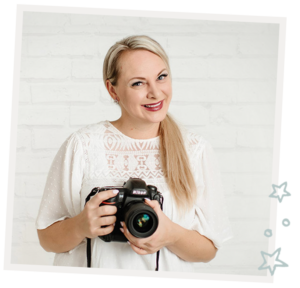
I'm
Lisa DiGeso
I’m on a mission to create uplifting online experiences for photographers ready to elevate their art, their business and their mindset.(...and have fun along the way!)



